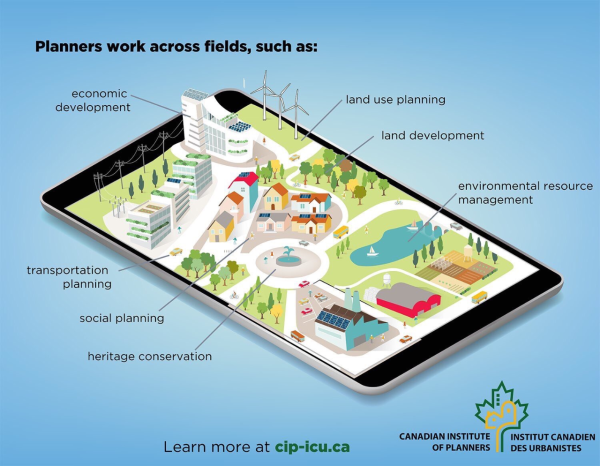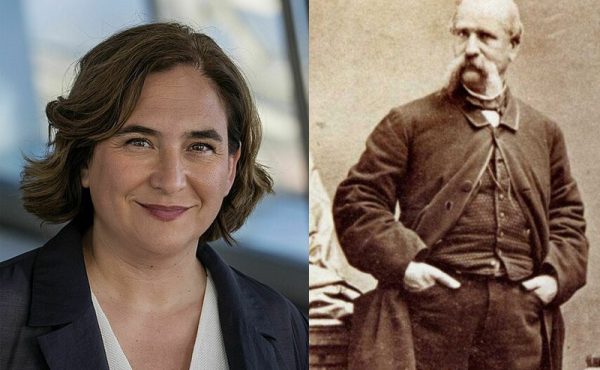
Community planning is inherently a collaborative endeavor and cross-disciplinary profession. Planning, designing, and building cities requires contributions from planners, architects, engineers, developers, and many other professionals, as well as engagement input from local residents and the general public.
Everyone Contributes to City Building
While certainly no one person or profession knows it all, having an understanding and appreciation of the interests and perspectives of others is critical to establishing a balanced approach and advancing initiatives that can gain wide support. A comprehensive community plan has different sections and many contributors.
What are the appropriate uses and densities for a parcel of land (or neighbourhood, or city, or entire region, for that matter), while considering infrastructure capacity, transportation and transit services, building designs that accommodate residents and businesses, and pleasant urban spaces between structures and streets? These are the questions addressed by multi-disciplinary teams working together.
From my ranging experience working in both the public and private sectors, I’ve certainly heard my share of engineers complaining about planners limited understanding of infrastructure, planners complaining about architects being overly focused on an individual building out of scale with the surrounding context, and developers complaining that municipalities are insensitive to costs. As my education and career includes both planning and business degrees, as well as policy and development experiences, I like to think I have a better-than-average understanding of both sides of the argument.
What do Planners do?
There’s what students learn at planning school, and what planners do at work. Most planners are employed at municipal planning departments, which are often organized into two sections: current or development planning and long-range or policy planning. Other planners work at various land use agencies and transportation authorities, as well as in the private sector as consultants and developers. Many have earned their professional planning designation, recognized as a Registered Professional Planner (RPP), contributing to the public good.
I’ve been a member of the provincial (PIBC) and national (CIP) planning institutes for over two decades, where they define the role and the profession as:
- Planning addresses the use of land, resources, facilities, and services in ways that secure the physical, economic and social efficiency, health and well-being of urban and rural communities.
- Professional planners use their knowledge, skills, and experience to help shape more livable, sustainable communities and environments.
While some planners are ‘generalists’, others have developed a specific focus and expertise, such as land use planning, land development, transportation, environment, etc (a select few with the super-niche of industrial lands planning), all contributing to a holistic community plan.
Here’s a list of the duties of a typical planner:
- Prepare reports on demographic, economic, cultural, social and environmental issues
- Recommend policies and guidelines for land use, environment, housing, and transportation matters
- Prepare plans for developing private lands, and coordinating public services
- Review proposals for developments to ensure they follow regulations and planning practice
- Consult with landowners, interest groups, agencies, and the public
That may not sound exciting to everyone, but that’s fine. As I tell my planning students, while a strong understanding of professional planning fundamentals are required (that is, functional competencies), much of planning is in fact collaboration, coordination, and communication, along with critical thinking and leadership (enabling competencies) to effectively work with other professionals and the public.
Why Cross-disciplinary Awareness is Critical
There are ways planners can learn from other professionals. Similarly, planners can inform other professionals. We can all better appreciate the many components of land-related and city-building efforts from fellow practitioners. This includes planners sharing their knowledge with non-planners, and planners learning how other professionals operate. This doesn’t mean getting another degree or reading more textbooks, but learning through targeted efforts, such as taking specific supplemental classes, widening one’s readings with articles and news, and attending varied events that attract different audiences.
Planners are ‘translators’, taking technical information and presenting it in a structured manner that considers all the implications in order to facilitate informed decision-making and balanced results.
Although current attention is usually on environmental sustainability, economic and social matters are also important and advanced through effective planning. As much as there may be a housing affordability crisis, a city also requires lands and uses for business and jobs, including industrial ones, for a prosperous society. For example, working as a team, there are opportunities through closely integrating land use planning, real estate development, engineered infrastructure, building designs, and asset management to improve community outcomes.
Working with Others
From my experience in both development planning and policy planning, local government planners draft policy that is responsive to societal needs and market forces, intended to guide viable and successful development. The knowledge needed to do this effectively can only be acquired through collaborating with many professionals, as well as public engagement and political leadership.
Certain planning-related organizations promote strong city building through professional collaboration. This includes the Urban Land Institute, the oldest and largest network of cross-disciplinary real estate and land use experts in the world, with a mission to shape the future of the built environment for transformative impact in communities worldwide. With a wide range of members, ULI has publications that touch on planning, design, and development aspects, and engaging events to bring different people together.
In British Columbia, every five years multiple land-related professionals host a joint conference, called the BC Land Summit. This ‘premier land and land-use conference’ is a unique inter-disciplinary event, bringing together planning, appraisal, agrology, landscape architecture, and real estate professionals, with a variety of sessions about topics that cross boundaries.
Learning With and From Others
Planners can also keep themselves informed and current by reading widely about city-building issues that are both directly and indirectly related to community planning, as well as listening to a range of opinions about urban matters, and attending events beyond those focused on planning. I do this myself and encourage my colleagues to do the same.
Moreover, planners and other land professionals can share their knowledge and perspectives with different audiences through various forms of engagement, collaboration, and communication. For example, reading and writing articles in planning, development, and similar magazines may lead one to link together policy objectives, market forces, and other issues about planning initiatives and development projects, rather than addressing them separately in isolation.
Lastly, for those with the confidence and desire to share their knowledge, teaching is a great way to contribute to the community. I personally teach academic courses to planning students and shorter classes to non-planners. There is always an opportunity to learn more.
In summary, community planning is a dynamic discipline that requires working within multi-disciplinary teams and having a wide understanding of urban issues. Those who are interested in the profession can expect to collaborate with many other professionals and engage with the public in meaningful ways, to advance sound planning that requires technical rigour and political leadership. Ultimately, this is what makes the profession rewarding and worthwhile.
**
Eric Aderneck is a Registered Professional Planner in the Metro Vancouver region. Over the past two decades, his diverse experience includes working for the public and private sectors through a number of different capacities including planning policy, real estate development, consultant, and instructor. Eric can be contacted at eric@aderneck.ca and www.linkedin.com/in/ericaderneck, www.LearnPlanning.ca




